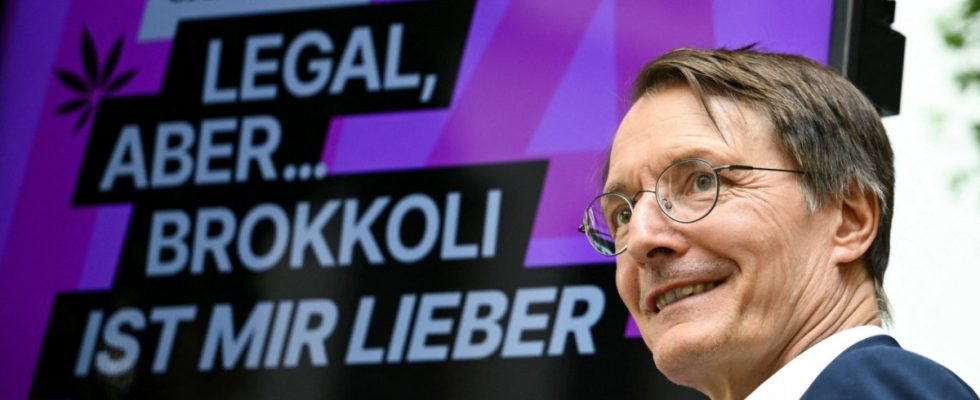Federal Health Minister Karl Lauterbach (SPD) has defended the government’s planned legalization of private cultivation and possession of cannabis against criticism. At the presentation of the draft law previously passed by the cabinet, he spoke on Wednesday in Berlin of a “long-term change in German drug policy”, which was necessary because of the previous “cannabis drug policy, which unfortunately failed”. According to Lauterbach, the fact that both advocates of further liberalization and opponents of conditional approval criticized the project as proof that the government had presented a bill “with a sense of proportion”.
According to Lauterbach, the traffic light coalition wants to use the law to counteract three problems: Cannabis consumption has been increasing for years. The trend also affects young people and adolescents and can also be seen in federal states with a repressive practice of persecution, such as Bavaria. Half of all drug offenses are related to cannabis. The government wants to relieve prosecutors and the judiciary. There is also a large black market, which is problematic because of toxic additives and high concentrations of the intoxicating substance tetrahydrocannabinol (THC). The opponents of liberalization have no answers.
What Karl Lauterbach expects from legalization
The federal government now wants to make the possession of up to 25 grams of cannabis in the form of marijuana (flowers and leaves of hemp plants containing THC) or hashish (resin) free of punishment for adults, as well as the cultivation of up to three cannabis plants. In addition, cooperatively organized associations with up to 500 members should be able to grow cannabis for their own use and sell it to their members, who must have their place of residence or habitual abode in Germany.
Clubs must be approved by the authorities and ensure that their members are of legal age. The levy is limited to 50 grams per month and 25 grams per day. For adolescents up to the age of 21, the federal government wants to limit the tax to 30 grams of cannabis, which may contain a maximum of ten percent of the active substance. The clubs must keep a minimum distance of 200 meters to schools, playgrounds, youth and sports facilities; In these protection zones, no cannabis may be consumed.
With the draft law, Lauterbach presented a federal government campaign to raise awareness of the dangers of cannabis use, which is intended primarily to appeal to young people and adolescents. One takes their protection seriously, said Lauterbach and complained that many were not sufficiently informed that up to the age of 25 the brain could be partially irreversibly damaged by cannabis consumption.
The minister refers to Canada, where consumption among young people has not increased
Every young person should be informed about this. The topic must be de-tabooed. The controversial debate about the draft law, which Lauterbach expressly welcomed, also contributes to this. He referred to positive experiences in Canada, where in the course of legalization it was at least possible to stop the further increase in consumption among young people.
The Minister of Health also expressed the expectation that the partial release of the drug and the cannabis clubs will help to push back the black market in Germany. In the clubs, consumers could obtain cannabis of controlled quality at competitive prices, Lauterbach promised. The SPD politician explained that when setting the limits for the fee, care was taken to ensure that the black market offer became less attractive. According to Lauterbach, the negative consequences of legalization in other countries have been carefully considered. In the Netherlands there is a lot of pressure from the black market, in the USA from the commercial sale of cannabis products in some states.
In the coalition agreement, the traffic light parties had set themselves the goal of introducing the “controlled sale of cannabis to adults for recreational purposes in licensed shops”. Lauterbach initially refrained from doing so, also because there are concerns about European law. However, he announced that he would present a second draft law later this year, which would allow cannabis to be sold commercially in model regions. He also promised a limit similar to that for alcohol for participation in road traffic. Transport Minister Volker Wissing (FDP) will work out a corresponding regulation.
SPD politicians also criticize the traffic light plan
Sharp criticism of the draft law came mainly from the Union. Bavaria’s Health Minister Klaus Holetschek (CSU) asked Chancellor Olaf Scholz to stop the plans. Lauterbach should not ignore the criticism of the German Medical Association, the German Association of Judges and the police union. North Rhine-Westphalia’s Interior Minister Herbert Reul (CDU) warned that the traffic light would put a greater strain on the police and judiciary. The draft law contains a large number of rules, prohibitions and restrictions. “All of this must be controlled and violations must be prosecuted,” he said. But Hamburg’s Interior Senator Andy Grote from the SPD said: “If there’s anything we don’t need now, it’s this law.” According to Lauterbach, the federal states have no way of blocking the legislative process. The draft does not require approval in the Bundesrat.
On the other hand, the addiction and drug policy spokeswoman for the FDP parliamentary group, Kristine Lütke, complained that the draft remained “well below expectations”. Small-scale regulations create an “uncontrollable bureaucratic monster”. The FDP firmly rejects an upper limit on possessions. The federal government’s drug commissioner, Burkhard Blienert, supported the draft, but called for more funds for prevention, for example for drug counseling in schools.

